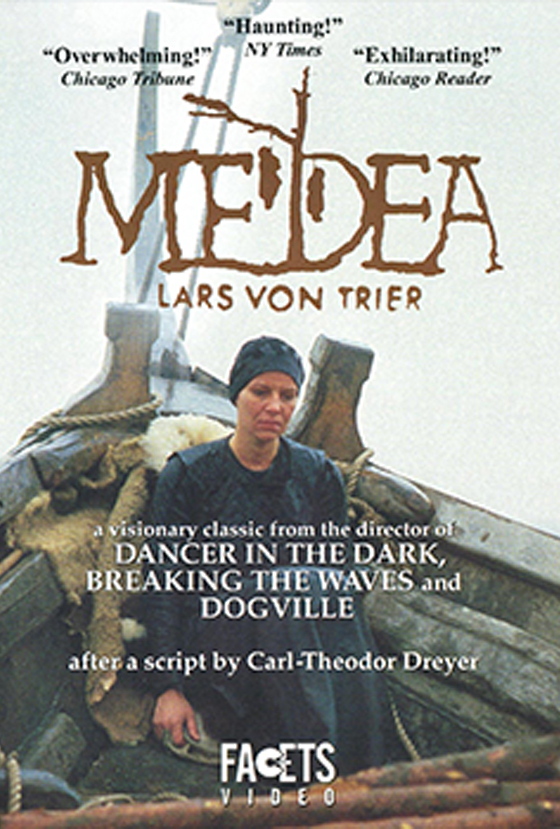
Repertory
Featuring an intro + post-film Q&A with Udo Kier.
Cinematic genius Lars von Trier explores the dark passions of a woman scorned in this shocking and powerful film, adapted from a screenplay by the great Carl-Theodor Dreyer (The Passion of Joan of Arc). The drama unfolds in shimmering marshlands and gloomy subterranean passageways. Medea is a foreign sorceress, abandoned by Jason, her lover. In a fit of mad, jealous rage, she plots a vicious revenge and murders her own children.
Medea is a revelation—the discovery of a rarely seen, legendary film from the director of Dancer in the Dark, Breaking the Waves, and Dogville. While making it, Lars von Trier claimed to be in constant telepathic communication with the co-author of the original script (based on the play by Euripides)—Carl-Theodor Dreyer.
There are few runs in recent cinema history more singular than Lars Von Trier from 1984 to 2000. Beginning with The Element of Crime all the way to Dancer in the Dark, Von Trier’s Europe trilogy, followed by his Golden Hearts trilogy, and then his mini-series The Kingdom, are an unmatched, high mark in modern, European filmmaking in terms of thematic boldness, visual innovation, and good old fashioned pushing the envelope. Nestled near the start of this run is the underseen and underrated adaptation of Carl Theodore Dreyer’s screenplay of Medea, made right on the heels of The Element of Crime. This intersection of the two Danish masters distills the story to its most primal essence, strips it of its choruses and divine interventions, and retranslates the setting from Greece to the Iron Age, bringing to the fore the story’s inherently gothic elements. Kirsten Olesen turns in a career best performance as the title character, and in a unique turn for him, Udo Kier as Jason gives one of the most magnetic and stoic performances of his career. Kier is one of the few actors in the world who can command the screen with his soulful eyes alone, in this case making them somehow seem permanently transfixed in a thousand-yard stare. Watching the horror as it unfolds. The film succeeds at being an homage to Dreyer while still standing on its own as a fitting addition to Von Trier’s catalogue. He once said “My films are about ideals that clash with the world. Every time it’s a man in the lead, they have forgotten about the ideals. And every time it’s a woman in the lead, they take the ideals all the way.” When one considers that, Medea seems like obvious subject matter for Lars Von Trier, and what could sum up his filmography better than Medea’s words in the original text by Euripides: “Who can stop grief’s avalanche once it starts to roll?”
Equally comfortable in leading parts or supporting roles, Udo Kier has one of the most fascinating careers in film. Breaking out as a star in Europe in the roles of Victor Frankenstein and Dracula, Udo has found his way into countless moments, small and big, in the lexicon of auteurs such as Paul Morrisey, Dario Argento, Rainer Werner Fassbinder, Lars von Trier, Gus Van Sant, Wim Wenders, Werner Herzog, Guy Maddin, John Carpenter, S. Craig Zahler, Alexander Payne and Kleber Mendonca Filho. His ineffable ability to find his way into the humble beginnings of so many cinema great’s is almost mystical, but might perhaps best be explained by his uncanny ability to always know where to find a great place for drinks.
The films showing this weekend will give only a small glimpse of the breadth and diversity of Udo’s career, but they are more than enough to make the case for his singular contribution to cinema.
| Distributor: | Facets |
| Country: | Denmark |
| Release Year: | 1989 |
| Runtime: | 76 |
| Director: | Lars von Trier |
| Rating: | Not Rated |
| Language: | In Danish with English subtitles |
| Format: | DCP |